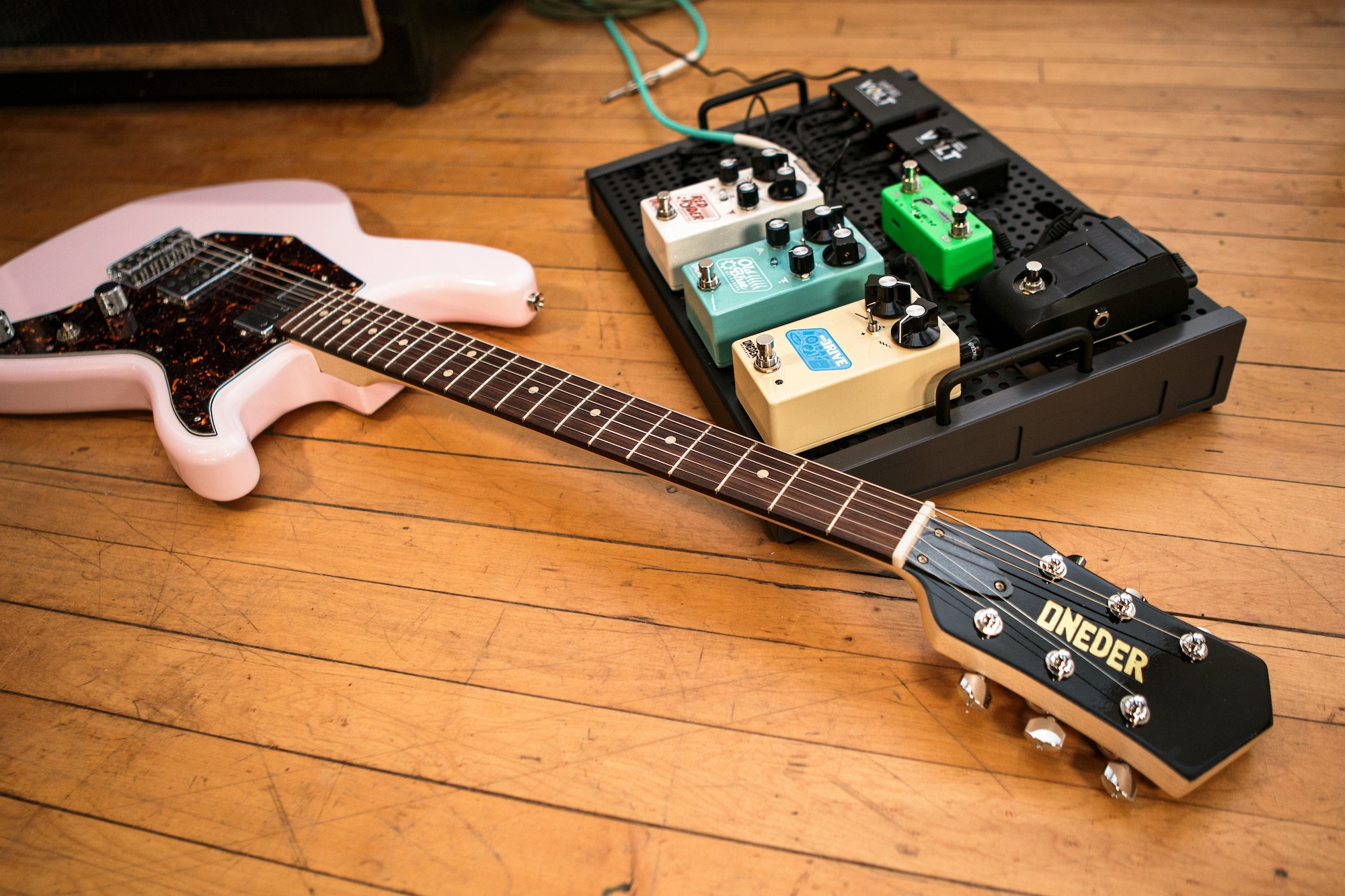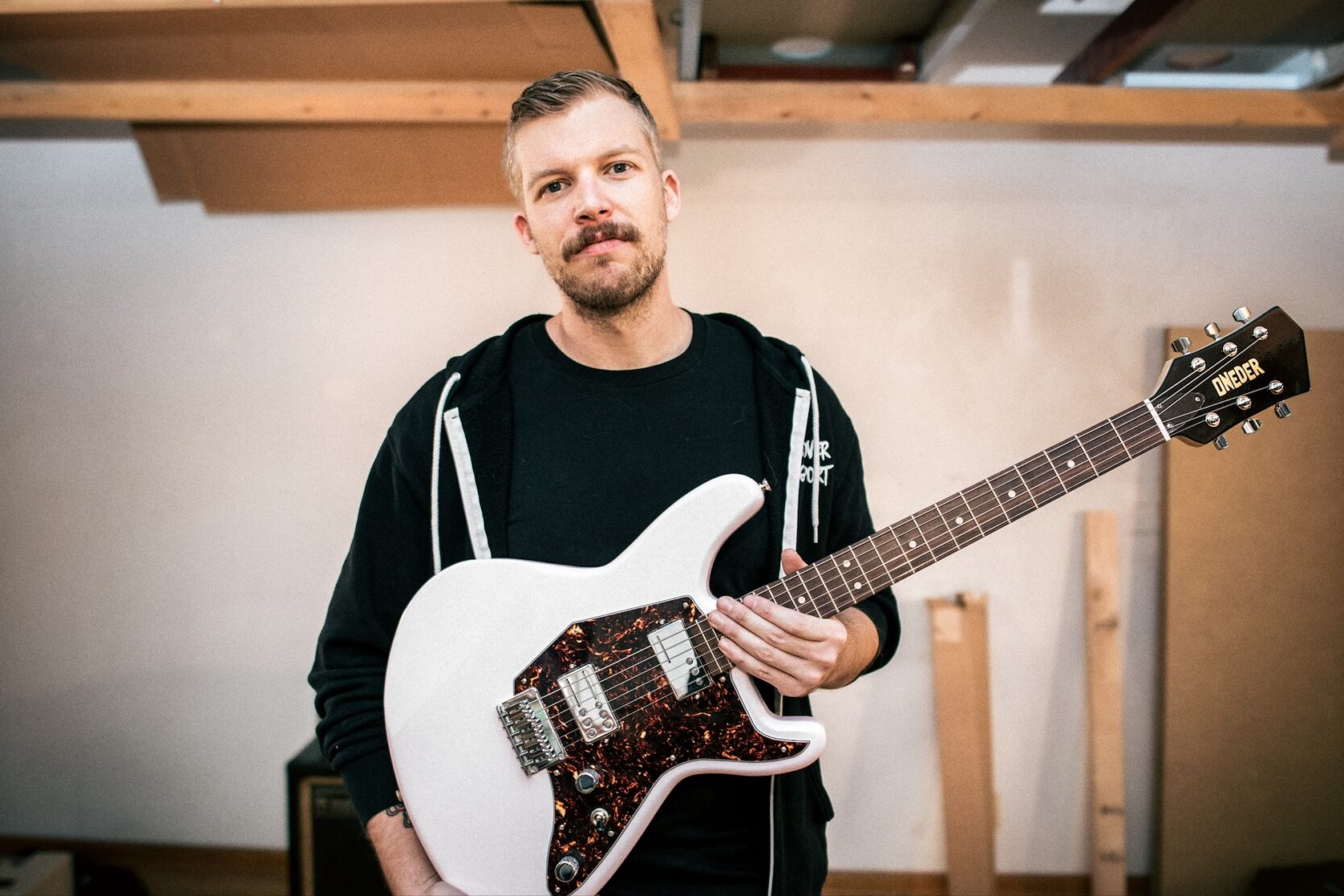Nick Diener has seen the music industry from more sides than most.
First, he was the vocalist and guitarist for The Swellers, the Warped Tour-friendly punk/emo band he and his brother led through the 2000s and early 2010s. Then, Diener moved away from performing to open Oneder Studios, where he would work as a producer and engineer for the next generation of punk/emo acts throughout the later 2010s. Then the COVID-19 pandemic hit, and suddenly in-person producing seemed like a risky and failing business venture for the Michigan-based dad.
When the world shut down, Diener turned to another facet of the industry that he always enjoyed — guitars and guitar effects. Using his Oneder branding and some ideas that had been kicking around in his head for a while, the veteran songwriter launched a pedal line called Oneder Effects. Within months, he’d developed both an online following and a roster of unique pedals — from the simple Oneder Boost to a unique spin on a RAT-like distortion called Red Ryder and his now-signature “emo sound” pedal, the Old Blue Overdrive.
But Diener didn’t stop there. Late last year, he launched the Oneder Guitar Company, giving people the chance to buy the signature guitar he was never famous enough to get from an outside brand.
SPIN spoke with the musical entrepreneur about his transition from rocker to builder and everything he has planned going forward.
SPIN: How did you decide you wanted to start your own pedal company?
Nick Diener: I came from a family where DIY wasn’t really in our vocabulary, so I was never really handy growing up. And then I had my band, but I realized that we were never going to be big enough for me to get a signature guitar model or signature guitar pedal made for me. So then, I was like “You know what? Maybe I’ll just get something designed for me that I can sell under my Oneder brand…” But a couple of good friends of mine convinced me that I could build the pedals myself, so I learned how to solder and realized that building a simple circuit board was not as difficult as I’d made it out to be in my mind. That moment not only gave birth to me starting a pedal company, but also made me realize that I can take on a lot of other things I’d been afraid to try myself.
At what point did you realize that Oneder Effects could be your full-time job?
Well, back when I was exiting the band and the touring world, I was getting really into fitness. I was like “You know what? Screw it. I’m feeling good. I’m gonna go to pro wrestling school. I’m gonna be a pro wrestler.” I went to pro wrestling school, and I realized a couple of months later that that was not the right move. I don’t regret it. I’m glad I gave it a try. But I knew I had to be a little bit more reserved and realistic. So the pedal company started as a fun hobby, and then a couple of friends wanted them, and that turned to 10 people on Instagram wanting pedals, and that turned into me making a separate Instagram for my pedal company. A month later, the pandemic started, so my studio and production shut down. At the end of 2020, my wife — who’s an accountant — is doing my taxes, and she said “Hey, it looks like being a pedal builder is your main job now.”
How did your time in The Swellers and as a producer lead you into owning Oneder Effects and now Oneder Guitar Company?
I realized that when I was in a band, one of my very favorite things was the gear. I didn’t realize that at the time, but I was always excited to look at pedals, guitars and amps and figure out my rig. If I talked to somebody after the show, I was the most excited when they asked about a guitar that I was playing or how I got my tone. Looking back on it, I didn’t really like the feeling of being in a band. I didn’t like who I was in that band. I wasn’t able to really be present. I was always just trying to figure out why our band wasn’t bigger. We were touring 9-10 months out of the year, so after we stopped touring, I got to be home and live a normal life. I could finally unpack my suitcase and leave it unpacked. When that happened, I realized that I really enjoyed being involved with music, but not necessarily being on a stage and in a spotlight. But being a record producer and engineer, I loved helping other artists sculpt their sound and hone their songwriting craft. But now that I have two kids, I have a very small window of uninterrupted time to work every day. so I have to choose wisely and work on my own schedule. That turned the studio into a friends and family only thing, and 2023 is going to be even more of me really focusing on Oneder Effects and Oneder Guitars.
Speaking of Oneder Effects, it seems like everyone has a different favorite pedal out of your lineup. How did you choose which models would make the cut?
I always loved my taste in guitar tone, as weird as that sounds. When I was able to get a great guitar tone in the studio or on a stage, it was so satisfying. So the goal was to make these little boxes that do different things that would’ve filled all of my needs. When I started the company, I told myself I wouldn’t get into the crazy technical aspects of the circuits. But then I realized I could hire someone for all of that stuff, and then someone else to do the enclosures, and I fell right into this perfect place where I got to be the creative force behind the pedals and tinkering with stuff. My goal when I started was to hit the ground running, and I got so much great advice and learned so much from people in the industry that I was able to have a small line of pedals out my first year. I started with the dirt section, which is what I would want on the bottom row of my pedalboard in the studio or live. There’s a really unique, weird drive called the Oneder Drive — which is one of those things where it’s either your favorite pedal ever or you don’t know what to do with it — then there’s the Oneder Boost, the Old Blue and the Red Ryder. And now we’ve got the new guy, which is the Heckboy.

What inspired you to launch the Oneder Guitar Company?
It was that same delusion of grandeur that made me think I could be a pro wrestler just because I lifted some weights. I was like “I could build a pedal, I could start a guitar company.” Matt Tunney is my good friend, and he’s a luthier and guitar repair guy. I brought him some of my guitars one day, and we started talking. I said “I got this guitar that I designed and spec’d out. It’s a unique design to me, and I really love it.” I’d been thinking maybe I could get them made overseas, but he was like “How about I build these guitars for you?” Within a couple of weeks, we decided to go into business together. We have three or four prototype guitars in the works right now, and we just recently moved into a much larger room to get this all done. We have a few more little things to get out of the way to finish up the last couple of guitars, and then we’re going to start taking orders. It’ll be a handmade, semi-custom shop sort of deal. It’s literally a dream come true. I always wanted my own signature model guitar, but you gotta draw a crowd for that to happen. My band was never big enough to get those kinds of accolades, so I’m going to build my own signature guitar without calling it my signature guitar.
Outside of the pedals and guitars, do you have any other big plans for 2023?
I’ve learned to just expect the unexpected. I would love to grow into a place where I can do more fun stuff, because for the first time in my life, I’m literally working my hands to the bone. There’s blood, sweat, tears and some major chiropractic work needed. I would love to take a step back and focus on the development of other products and marketing. I love making demo videos and things like that. The creative side of things has always been the most fun for me. I’m literally taking it day by day at this point, because it’s so unpredictable. Being your own boss is really gratifying, but it’s also super scary. You’re not guaranteed next month in your line of work, and we’ve definitely had a couple of slow months where I’m like “Oh boy, maybe this is it.” But I found that as long as I’m having fun and fulfilling my need to be creative, it’s keeping me happy as a person. It seems that other people take notice and enjoy what I enjoy, so that’s really the only thing I can count on at this point.
So you’re saying we won’t see a Swellers reunion?
I would say “Never say never,” but it seems every year that we get further away from it. We stopped touring in 2015, and we’re all getting busier and busier. I think people are almost expecting us to get back together at some point, but every year, there are more kids and more businesses. My brother works for a marketing agency, tours the world with several bands and has a coffee business — so he and I both moved on to selling things in small packages and coming up with fun ways to market them. I haven’t made music of my own in over half a decade, which is actually really scaring me. That was my life, but I’ve been so busy working on other stuff that I haven’t had the drive to create until very, very recently. I think we’ll see some music from me in 2023, but I don’t know if that’s going to be low-tuned sludge pop or banjo and acoustic guitar. But, honestly, the Swellers reunion I want to see would be just hanging out with the guys and meeting their kids. I’ve only seen the other band members three or four times since we broke up, which kind of breaks my heart. We live in different parts of the country, but maybe we’ll reunite for a backyard barbecue with no music involved.





